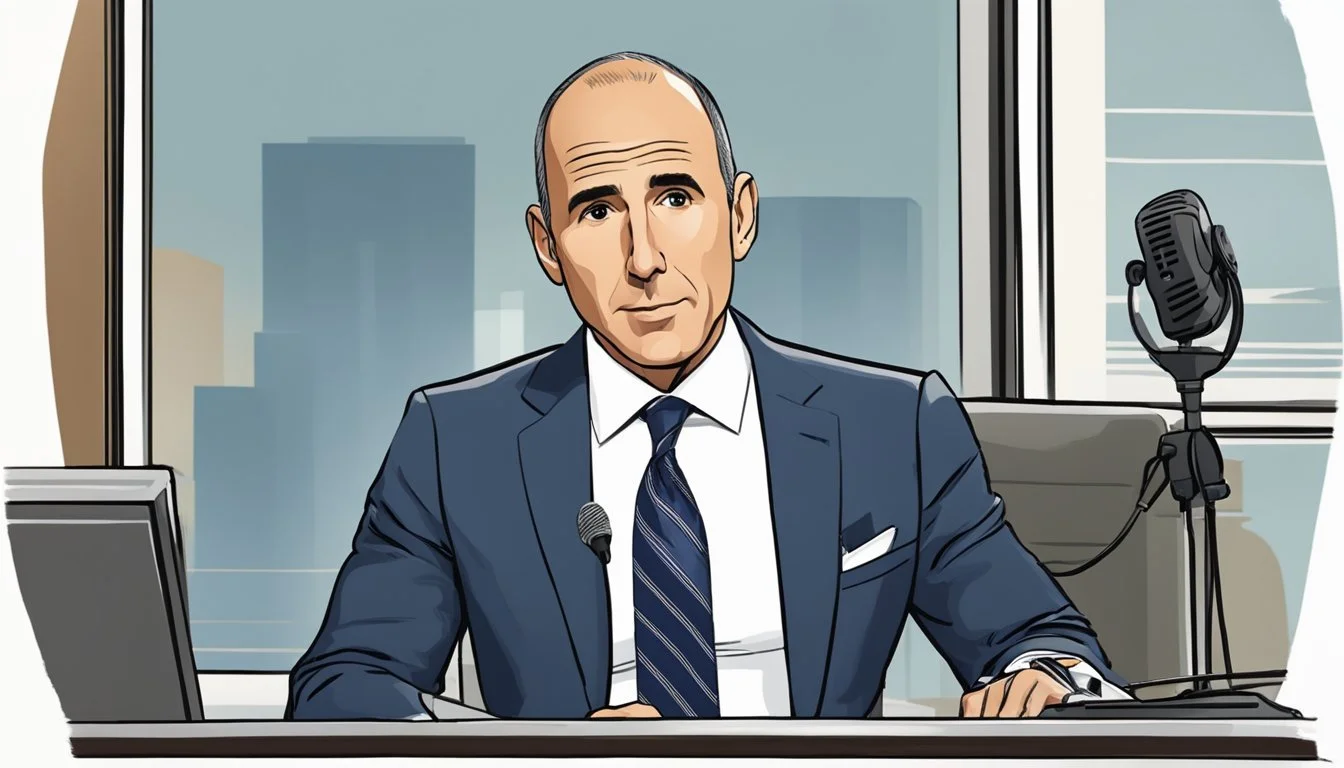Matt Lauer: NBC's $40 Million Man Toppled by #MeToo
Fall of a TV Icon
Matt Lauer's spectacular fall from grace shook the media world in 2017. As the co-host of NBC's Today show, Lauer had risen to become one of the highest-paid figures in television news, commanding an annual salary of $20 million. His firing over allegations of sexual misconduct marked a seismic shift in how networks addressed workplace behavior and highlighted the power of the #MeToo movement.
NBC's swift action in terminating Lauer's contract sent shockwaves through the industry. The network faced scrutiny over its handling of the situation, including questions about whether executives had prior knowledge of Lauer's alleged behavior. The scandal exposed the stark power imbalances that often exist in television newsrooms, where star anchors wield considerable influence.
Lauer's dismissal came at a significant financial cost to both himself and NBC. Reports suggest he sought a $30 million payout for the remainder of his contract, though it's unclear if he received any severance. The incident underscored the high stakes involved when major networks confront misconduct allegations against their top talent.
Matt Lauer's Career at NBC
Matt Lauer became one of the most recognizable faces on American television during his two-decade tenure at NBC. His rise through the ranks and eventual prominence as the lead anchor of the Today Show made him a highly influential and well-compensated figure in broadcast journalism.
Rise to Prominence
Lauer joined NBC News in 1992 as a fill-in anchor on Today. He quickly climbed the ladder, becoming a full-time news anchor for the show in 1994. His big break came in 1997 when he was promoted to co-anchor, replacing Bryant Gumbel.
Lauer's affable personality and interviewing skills helped Today maintain its position as America's most-watched morning show for much of his tenure. He covered major events like the 9/11 attacks and multiple Olympic Games.
His influence extended beyond morning television. Lauer conducted high-profile interviews with political figures, celebrities, and newsmakers. These interviews often made headlines and solidified his status as a top journalist.
Earnings and Impact
As Today's lead anchor, Lauer commanded an impressive salary. Reports suggest he earned up to $20 million annually at the peak of his career. This made him one of the highest-paid personalities in television news.
Lauer's value to NBC was significant. The Today Show generated substantial advertising revenue for the network. His presence was seen as crucial to the show's success and ratings dominance.
His influence extended to personnel decisions and the show's direction. Lauer had a say in choosing co-anchors and shaping content. This power underscored his importance to NBC's morning lineup and overall news division.
The #MeToo Movement
The #MeToo movement sparked a global conversation about sexual misconduct and accountability. It exposed widespread issues across industries and empowered victims to speak out against abusers in positions of power.
Origins and Significance
The #MeToo hashtag went viral in October 2017 following sexual abuse allegations against Hollywood producer Harvey Weinstein. However, the phrase was originally coined by activist Tarana Burke in 2006 to support survivors of sexual violence.
The movement gained massive momentum on social media. Millions of people shared their experiences of sexual harassment and assault using #MeToo. This highlighted the pervasiveness of the issue.
#MeToo led to increased accountability. Many powerful figures in entertainment, politics, and business faced consequences for alleged misconduct. It sparked important discussions about workplace cultures that enable abuse.
Influence on Media and Entertainment
The media and entertainment industries saw significant impacts from #MeToo. High-profile figures like Matt Lauer, Charlie Rose, and Kevin Spacey lost their positions due to sexual misconduct allegations.
Many companies implemented stronger sexual harassment policies. Some productions added intimacy coordinators to oversee intimate scenes. Award shows addressed the movement, with attendees wearing black or Time's Up pins in solidarity.
The movement also influenced content creation. More stories centered on sexual misconduct and its impact began appearing in film and television. Some projects with accused abusers were shelved or recast.
#MeToo prompted a cultural shift in how sexual misconduct is viewed and discussed in the entertainment world. It emphasized the importance of respect and consent in professional relationships.
The Fall of a News Anchor
Matt Lauer's career at NBC came to an abrupt end in November 2017. A single complaint triggered a swift response from the network, leading to broader revelations about workplace misconduct.
Initial Complaint
On November 29, 2017, NBC News fired Matt Lauer after receiving a detailed complaint from a female colleague. The allegation involved inappropriate sexual behavior in the workplace. NBC acted quickly, terminating Lauer's employment within 48 hours of the complaint.
The network stated this was the first complaint they had received about Lauer during his 20+ year tenure. However, the rapid response raised questions about potential prior knowledge of issues.
Lauer had been a familiar face on "Today" for two decades. His sudden departure shocked viewers and colleagues alike.
Broader Implications
Lauer's firing occurred during the height of the #MeToo movement. It highlighted how even powerful media figures could face consequences for misconduct.
The incident sparked discussions about workplace culture in television news. Questions arose about how Lauer's behavior had gone unchecked for so long.
NBC faced scrutiny over its handling of the situation. Critics questioned whether the network had ignored previous warning signs.
The fallout affected Lauer personally and professionally. He lost trust in others and withdrew from public life. His reputation, built over years in the spotlight, crumbled rapidly.
NBC's Response to the Allegations
NBC took swift action following the allegations against Matt Lauer. The network launched an internal investigation and issued a public statement addressing the situation.
Internal Investigation
NBC initiated a thorough internal investigation immediately after receiving the complaint against Lauer. The network's executives assembled a team to review the allegations and gather additional information. This investigation aimed to determine the extent of Lauer's misconduct and identify any potential systemic issues within the organization.
The investigative team interviewed current and former employees, reviewed internal communications, and examined company policies. NBC also hired an external law firm to ensure an impartial assessment of the situation.
Public Statement
NBC News Chairman Andy Lack released a statement on November 29, 2017, announcing Lauer's termination. The statement emphasized the network's commitment to maintaining a safe work environment for all employees.
Lack's statement disclosed that the complaint received was the first against Lauer in his 20+ years at NBC. However, it also mentioned the possibility of additional incidents.
NBC executives held meetings with staff to address concerns and reiterate the company's zero-tolerance policy for sexual misconduct. The network pledged to implement stricter reporting procedures and enhance employee training programs to prevent future incidents.
Legal and Ethical Considerations
Matt Lauer's termination from NBC raised complex legal and ethical issues. The case highlighted the challenges of addressing workplace misconduct in high-profile media organizations.
Lauer's Legal Defense
Matt Lauer retained legal counsel to negotiate his exit from NBC. His lawyers argued for a payout based on his $20 million annual contract. However, NBC refused to provide severance, citing a morality clause violation.
Lauer's team explored potential wrongful termination claims. They questioned NBC's handling of the allegations and the speed of his dismissal. The network maintained it acted appropriately given the serious nature of the complaints.
Ethical Responsibilities in Journalism
NBC faced scrutiny over its ethical obligations as a major news organization. Critics argued the network should have detected and addressed Lauer's alleged behavior sooner.
Questions arose about potential conflicts of interest in investigating a star anchor. Some called for an independent review of NBC's practices and culture. The incident sparked industry-wide discussions on preventing and reporting workplace misconduct.
Media ethics experts emphasized the importance of fostering safe work environments. They urged news organizations to prioritize employee well-being over protecting high-profile talent.
Industry Reaction and the Role of Competitors
Matt Lauer's firing sent shockwaves through the media industry. Competitors and analysts scrambled to cover the story and assess its implications.
CNN's Coverage
CNN quickly reported on Lauer's termination from NBC. The network highlighted the allegations of sexual misconduct and NBC's swift action. CNN anchors expressed surprise at the news, given Lauer's long-standing prominence in morning television.
CNN interviewed media experts who discussed potential impacts on NBC's "Today" show ratings and ad revenue. The network also explored how Lauer's departure might affect the competitive landscape of morning TV.
Media Analysis
Industry analysts examined the broader implications of Lauer's firing. Many pointed to it as a watershed moment in the #MeToo movement's impact on television news.
Some experts predicted a reshuffling of morning show viewership. They speculated on whether ABC's "Good Morning America" or CBS "This Morning" might gain audience share.
Media watchdogs praised NBC for its quick response to the complaints against Lauer. However, questions arose about whether the network had ignored previous issues with the anchor.
Personal and Public Repercussions
Matt Lauer's firing from NBC had far-reaching consequences, both for his career and public image. The scandal fundamentally altered his professional trajectory and public perception.
Lauer's Career After NBC
Matt Lauer's career effectively ended with his termination from NBC. The network refused to provide a payout for the remainder of his contract, estimated at $20 million per year. Lauer retreated from the public eye, making no attempts to return to television or media. His fall from grace was swift and complete, with no major network or media outlet willing to work with him.
Lauer issued a public apology, acknowledging some wrongdoing while disputing other allegations. He sold properties and focused on his personal life away from the spotlight. Opportunities for a comeback remained nonexistent due to the severity of the allegations and the changed media landscape in the wake of #MeToo.
Public Opinion
Public perception of Matt Lauer shifted dramatically after his firing. Once a beloved morning show host, he became a symbol of workplace sexual misconduct. Many viewers expressed shock and disappointment at the revelations about his behavior.
Social media reactions were overwhelmingly negative, with many praising NBC for taking swift action. Former colleagues distanced themselves, and Lauer's decades of work were overshadowed by the scandal. Public opinion polls showed a significant drop in his favorability ratings.
The case sparked broader discussions about power dynamics in the workplace and the importance of addressing sexual harassment. Lauer's downfall served as a high-profile example of the #MeToo movement's impact on holding powerful men accountable for their actions.
Long-Term Impact on the Broadcasting Industry
Matt Lauer's abrupt dismissal from NBC sent shockwaves through the broadcasting world. It highlighted the urgent need for systemic change in workplace culture across the industry.
Networks implemented stricter policies against sexual misconduct. They established clear reporting procedures and consequences for violations. Many companies mandated comprehensive training programs on respectful behavior and consent.
The incident sparked a broader conversation about power dynamics in media. It led to increased scrutiny of high-profile personalities and executives. Networks became more proactive in vetting potential hires and investigating allegations.
Women gained more prominent roles in broadcasting. Networks made concerted efforts to promote diversity in leadership positions. This shift aimed to create more balanced and inclusive workplaces.
The financial impact was significant. NBC lost millions in advertising revenue following Lauer's departure. Other networks faced similar challenges when addressing misconduct allegations.
Employee contracts underwent revisions. Morality clauses became more common, allowing for swift termination in cases of inappropriate behavior. This change emphasized personal accountability for on-air talent.
The incident underscored the importance of fostering a culture of respect in broadcasting. It demonstrated that no one, regardless of status or popularity, was exempt from consequences for misconduct.



